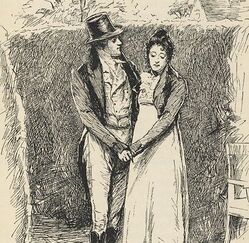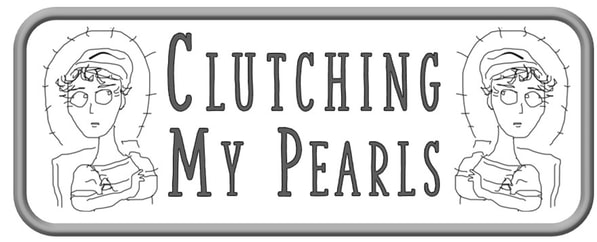| Some Jane Austen fans want to acquit her of being a woman of the long 18th century. Clutching My Pearls is my ongoing blog series about my take on Jane Austen’s beliefs and ideas, as based on her novels. Click here for the first in the series. In last week's post, I looked at the suggestion that the gypsies in Emma were a veiled reference to the consequences of land enclosure. |
 "How I love... your father's estate."
"How I love... your father's estate." I don't object in the least if you don't like Mr. Knightley. To each his own. It's also understandable if you can't enjoy Emma because of its preoccupation with social class. If, after watching the 2020 movie version of Emma, you conclude that it's a story about selfish people who treat their servants like machines, I take your point. But, it's quite another thing to insist that Jane Austen intended for us to dislike Mr. Knightley.
George Knightley, the owner of Donwell Abbey, makes his money from his own farmland and from the rents of his tenants. Therefore Dr. Kelly, author of Jane Austen: The Secret Radical, wants to convince us that the leading man in a romantic comedy of manners is actually the villain of a tragedy about land enclosure.
The enclosure movement involved a changeover from open farmland held and worked in common, to a system where fields and forests once used by everybody were fenced off so that poor people could not graze their cows, or gather berries, nuts, or firewood.
And how do we know that Knightley is a villain? ....
No reason, that is, unless you are writing a book set in a little English country village where the main male character is the leading landowner and farmer in the area? And what is "politicized," for example, about the the following:
[When John Knightley, a lawyer from London, is visiting with his older brother George] "The brothers talked of their own concerns and pursuits… As a magistrate, [George Knightley] had generally some point of law to consult John about, or, at least, some curious anecdote to give; and as a farmer, as keeping in hand the home-farm at Donwell, he had to tell what every field was to bear next year, and to give all such local information as could not fail of being interesting to a brother... The plan of a drain, the change of a fence, the felling of a tree,.. was entered into with as much equality of interest by John, as his cooler manners rendered possible…”
| The Agricultural Revolution vastly increased the amount of food produced in the UK | That, by the way, is the only reference to a fence in the entire novel. The word “hedge” appears four times, and one of those hedges is the ‘low hedge’ of a miserable cottager, marking the boundary of her own little garden. (Update: for examples of other novels of this era which mention hedges in non-political ways, see this post.) In comparison, the word “cards” appears five times in Emma. Mrs. Goddard is invited to the Woodhouses to “win or lose a few sixpences by his fireside.” Why not claim Emma is a novel about the scourge of gambling? There is much ado about Mr. Woodhouse and his fussiness over food. Jane Fairfax turns down Emma's gift of arrowroot. "It was a thing she could not take." Why not say Emma is a novel about eating disorders? |
And, the word "enclosure" is not mentioned at all in Emma! As opposed to Sense & Sensibility, where enclosure is mentioned twice. A scholarly article about "Jane Austen and the Enclosure Movement" in the journal of the Jane Austen Society of North America discusses references to enclosure in Sense & Sensibility and Northanger Abbey, but doesn't mention the hedges of Emma.
According to Dr. Kelly, we aren't supposed to believe Mr. Knightley when he tells Emma that he loves her. He's marrying her for her land, whatever acreage the Hartfield estate sits on, so he can enclose it and make the poor villagers in the area still poorer. Further, he's a bad landlord who doesn't care about the welfare of his tenants because he "abandons" Donwell Abbey (as though he could not go there during the day--it's within walking distance), to move in with the Woodhouses.
 Bill Nighy as Mr. Woodhouse in the 2020 Emma movie
Bill Nighy as Mr. Woodhouse in the 2020 Emma movie “True, true,” cried Mr. Knightley, with most ready interposition—“very true. That's a consideration indeed.—But John, as to what I was telling you of my idea of moving the path to Langham, of turning it more to the right that it may not cut through the home meadows, I cannot conceive any difficulty. I should not attempt it, if it were to be the means of inconvenience to the Highbury people, but if you call to mind exactly the present line of the path.... The only way of proving it, however, will be to turn to our maps. I shall see you at the Abbey to-morrow morning I hope, and then we will look them over, and you shall give me your opinion.”
The footpath is probably a right-of-way, a shortcut which has been used by local people since time out of mind. However, the meadows are being used for grazing animals or growing hay or something, and it would be both safer for the people and more efficient for the farm to move the path. Mr. Knightley would have to hire local labourers to create a new clearly-marked path that skirts the meadows.
In his annotated Emma, David M. Shapard points to this same passage as an example of Mr. Knightley’s thoughtfulness to the local people, thoughtfulness which sets him apart from other landowners of his class. He will not move the path until he can demonstrate that it won’t inconvenience anyone.
Is there a secret message here? Not necessarily. Austen uses the footpath for comic reasons. It's part of a running joke in Chapter 12, where Emma and Knightley work together to distract John Knightley by introducing a new conversational topic whenever he starts getting snappish with Mr. Woodhouse.
 The Poultry Thief by Louis Theodore Devilly
The Poultry Thief by Louis Theodore Devilly Kelly reckons this theft must have been carried out by a hungry local villager, because the gypsies are gone by this point in the novel. (On the other hand, it might have been a professional gang of roaming poachers, who caught black-market game for London’s dining tables. Maybe they also stole domesticated fowl. “Other poultry-yards in the neighborhood also suffered,” Austen writes. This sounds like a criminal gang working methodically. If a poor villager suddenly had a yard full of turkeys and a full stew pot, the neighbours would have noticed.) Or, perhaps the turkey thieves were desperate. Perhaps enclosure is happening in Highbury during the period of the novel; it probably is or already has. We can speculate all we want about who purloined the poultry. Were we supposed to feel uneasy about this "ominous" theft when the only person who was frightened was Mr. Woodhouse, and, as we've been told throughout the novel, Mr. Woodhouse is an extremely neurotic man?
Or are we supposed to laugh at Austen's ironic twist -- in the end, Mr. Woodhouse's habits of selfish nervousness actually made the marriage possible? The fact is that in terms of her plot, Austen had written herself into a corner. Emma's best trait is her patience and love for her father. Her feelings of duty made it impossible for her to leave his roof: "With respect to her father... a very short parley with her own heart produced the most solemn resolution of never quitting her father — She even wept over the idea of it, as a sin of thought. While he lived, it must be only an engagement."
Austen had to resolve this issue before writing her happy ending, and she did. We should look first at the narrative structure and logic of the novel before delving around for hidden meanings.
 "Badly done, Emma!"
"Badly done, Emma!" The most significant thing about Mr. Knightley is not that he wants to move a footpath that is cutting across his meadows, it is not that he throws a “Marie Antoinette"-style strawberry picnic for his privileged social circle, it’s that he is the moral arbiter of Emma.
Throughout the novel, Mr. Knightley is making judgements. Emma thinks Robert Martin is unworthy of Harriet. Mr. Knightley disagrees. Emma is wrong and Mr. Knightley is right. He's worried about the consequences of Harriet's friendship with Emma. His premonitions are correct. He has a clearer understanding of Mr. Elton's character than Emma. He’s suspicious of Frank Churchill. He's right to be. He realizes Jane Fairfax is hiding a secret. He scolds Emma for making fun of Miss Bates in front of everyone at the Box Hill picnic. Everything Mr. Knightley says about Emma’s faults is correct, and she comes to realize this. "What had she to wish for? Nothing, but to grow more worthy of him, whose intentions and judgment had been ever so superior to her own." His approval means everything to her. If he is a villain, then what is she?
As Professor John Mullan pointed out, there's a problem with insisting that Knightley is not a hero, but actually a villain. Dr. Kelly is ignoring the narrative logic of the story. Where is the payoff for the reader in a story about a man who worries about the heroine, who does kind and thoughtful things for Miss Bates and her mother, who steps up and dances with a humiliated young woman at a public ball, who protects his housekeeper from the interference of Mrs. Elton, who speaks of a yeoman farmer with praise -- but marries Emma just so he can get his hands on her father’s lands?
To make Mr. Knightley into the villain of the tale is to turn it upside down; in fact, to remove any inducement for reading such a strangely constructed book. I am not denying that land enclosure created significant problems for poor people in England through the 18th century, I am just saying that Emma is not about land enclosure and Knightley is not intended to be a villain.
Dr. Kelly also claims that Austen merely hints at radical themes because of the restrictive times in which she lived. Criticizing the authorities could get you in trouble, even sent to prison. That's why we have to read Austen carefully, to understand the hints given within, which Kelly believes Austen's contemporary readers would have understood. But did they? f Knightley's villainy is so apparent, why have all of Austen's previous readers been so obtuse in seeing him as both the hero and moral arbiter of the story? Why doesn't Kelly explain why Austen recorded in her own notes that Mr. Knightley was "liked by everybody"? Or, if they didn't like him, as Edward Lord Braborne did not like him, it was because he was what we today call a mansplainer, not because he was enclosing lands.
Is Kelly correct? If Austen had been opposed to land enclosure, would it have been dangerous for her to say so?
| The poultry thief in the painting appears to be a soldier. One can picture poor soldiers in the militia, stationed about England, unable to resist the temptation to steal food to supplement their rations. And disabled soldiers and sailors who returned from fighting Napoleon were often reduced to begging. In my Mansfield Trilogy, Fanny Price's brother Sam becomes radicalized when he returns to England after the war is over. Click here for more information about my novels. You can read Lord Brabourne's opinion about Mr. Knightley in The Letters of Jane Austen, The Brabourne edition. More unfounded speculation about the characters in Emma is discussed here. |

 RSS Feed
RSS Feed